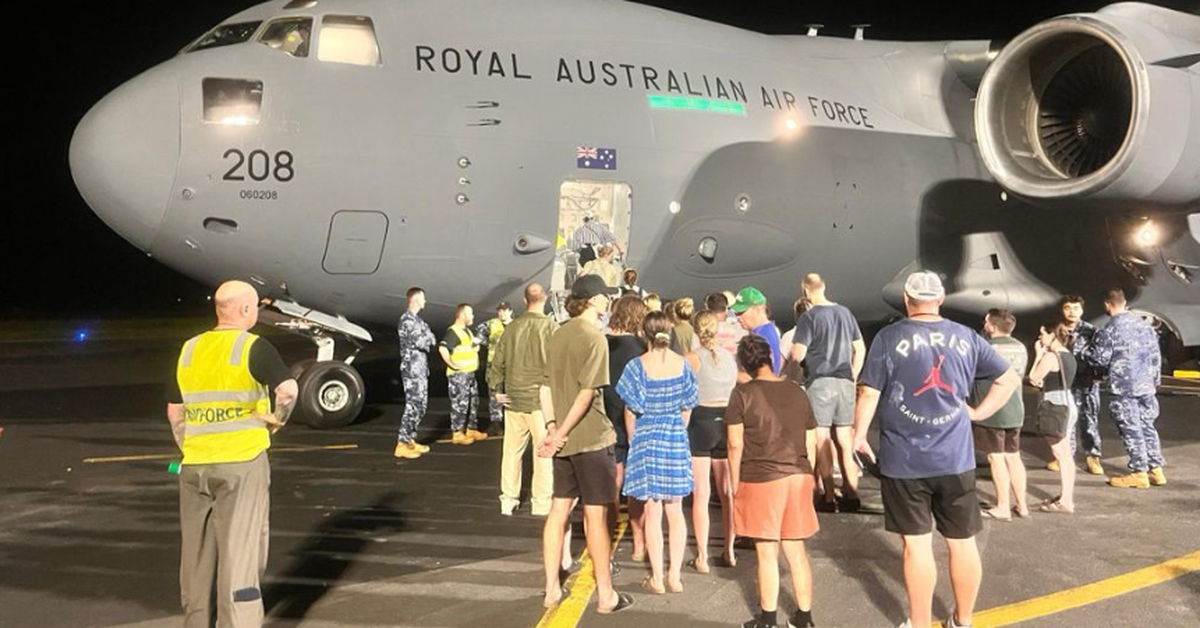China lashes out over dangerous helicopter confrontation as Albanese faces pressure to contact Xi Jinping

- by Admin
- May 6, 2024
China’s Foreign Ministry has lashed out at Australia for the latest military confrontation between the two countries — a dangerous interception of an Australian helicopter in international waters.
Prime Minister Anthony Albanese is under pressure to contact China’s President Xi Jinping after the near-miss incident.
On Saturday, an MH-60R Seahawk, which had launched from HMAS Hobart, was intercepted by the People’s Liberation Army Air Force as it was taking part in a United Nations mission to enforce sanctions against North Korea.
Australia has accused China of dangerous behaviour. However, Chinese Foreign Ministry spokesman Lin Jian blamed Australia, saying the helicopter “deliberately flew within close range of China’s airspace in a provocative move”.
“The Chinese side took necessary measures at the scene to warn and alert the Australian side. The way the situation was handled was consistent with our law and regulations [and was] was professional and safe,” he said.
The federal government has already lodged multiple diplomatic representations with China over the confrontation, but Mr Lin said China had made its own diplomatic complaints.
“China has launched serious complaints with the Australian side on these risky moves. We urge Australia to stop provocations to prevent misunderstanding and miscalculation,” he said.
Earlier on Tuesday Mr Albanese said China’s actions had been “unprofessional and unacceptable”.
“Australian Defence Force personnel were going about their job, their job in international waters, but also in international skies, to support the United Nations and the sanctions that they have against the North Korean regime,” Mr Albanese said.
The prime minister said that the government had made “very strong representations at every level to China” about the incident, but did not say he had spoken with President Xi.
He added that the Chinese premier would be visiting Australia in June, when he would raise the incident with him.
“Dialogue is important. It’s always, always important to have avenues of communication and that’s why we’ve used all of those avenues of communication to make our position on this incident very clear,” Mr Albanese said.
Opposition Leader Peter Dutton, who served as defence minister during the Morrison government, demanded Mr Albanese raise the matter directly with Jinping.
“I fear that an Australian Defence Force member or members are going to lose their lives at some point because there will be an error in judgement by one of the fighter pilots or one of the naval personnel from the Chinese side,” he told Channel 7.
“I think the prime minister should pick the phone up to the Chinese president to express his dismay and really disgust with what has happened. They have put Australian lives at risk and that is completely unacceptable.”
US ‘deeply concerned’
US assistant secretary of state Daniel Kritenbrink, who is visiting Canberra this week, told journalists the confrontation was the latest in a “string” of incidents where China had unsafely intercepted Western military assets in the region.
“We are deeply concerned to see reports of this incident,” he said.
“Obviously we stand with our Australian allies.
“This is not a new phenomenon … this is something that has been going on for years.”
Mr Kritenbrink said China’s approach in the region had been increasingly aggressive and added any miscalculation could endanger lives.
“You could have an accident which could put someone’s life at risk, so we have to be careful here,” he said.
“These are not just abstract principles we’re talking about.”
But he played down suggestions that China’s military or government might be responding directly to the recent announcement that Australia, the US, Japan and the Philippines would expand military defence cooperation and joint military exercises.
“I would be somewhat sceptical … I would probably hesitate to say it’s linked to one specific event because when you look at the larger scope of what PRC counterparts have been up to … the general trend is a Chinese military being more aggressive and more assertive,” he said.
“This is a long-term challenge. I think the best way forward is to continue to demonstrate resolve.”
“If we’re countries which collectively believe in the rule of law and the professional conduct of our militaries, then I think we stick to those principles.”
‘Unsafe and unprofessional’
The Department of Defence has described the actions of the J-10 Chinese Air Force plane as “unsafe and unprofessional” following the incident in the Yellow Sea.
Defence Minister Richard Marles condemned the behaviour of the Chinese military and said Australia conveyed its concerns via diplomatic channels to Beijing.
Last week the defence ministers of Australia, the United States, Japan and Philippines met in Hawaii where they resolved to cooperate more to counter China’s increasingly assertive military behaviour in the region.
“A very significant message to the region and to the world about four democracies which are committed to the global rules-based order,” Mr Marles said at a joint news conference after meeting his counterparts.
The weekend incident involving flares occurred a day after the ABC revealed Australia’s navy chief had recently confronted his Chinese counterpart over another incident last November where divers were injured in a sonar attack also in international waters.
Posted , updated
The Latest News
-
December 23, 2024Here’s why Golf Twitter lost its damn mind over Team Langer’s PNC victory – Australian Golf Digest
-
December 23, 2024Social Media Ban in Australia: What Online Casinos Can Learn on Responsible Gambling Practices? – Insights from CasinoAus
-
December 23, 2024From smaller homes to screen time, backyard cricket is facing challenges in modern Australia
-
December 23, 2024This quiet Canadian will make you love YouTube golf again – Australian Golf Digest
-
December 23, 2024Guide Helps Australian Workers Expose Tech Wrongdoings




